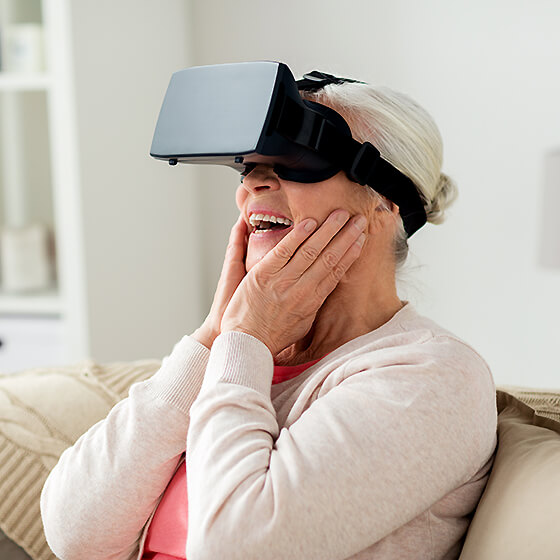Imagine having the opportunity to visit incredible sites or peaceful forests. What it might feel like to have those new and exciting or relaxing experiences available regardless of your physical space or ability level. Virtual Reality (VR) has been around for a long time, however, in a contemporary sense VR technology is more affordable and more accessible than ever. The reality of immersing yourself in a peaceful beach may not be far off, and this accessibility opens new opportunities within the context of healthcare. Some hospitals have already integrated virtual reality, and current studies are being performed on the effectiveness of this virtual reality therapy on patients with Alzheimer’s disease. There is a preliminary hypothesis as to what the benefits may be based on the early results of integrating virtual reality into programs with patients with Alzheimer’s.
Potential benefits of Virtual Reality
As healthcare integrates virtual reality, various purposes and benefits are presenting themselves. Virtual Reality can be used to implement programs to educate healthcare workers, soothe patients with anxiety or other mental illnesses as well as provide enriching entertainment for people living with Alzheimer’s. A potential concern of healthcare providers and researchers is that patients may not find the headsets comfortable to wear, however, programs that utilize Virtual Reality have not, in general, found that to be the case. Overall, the hardware does not seem to bother them. The positive outcome specific for patients with Alzheimer’s and dementia is that Virtual Reality seems to build a connection to memory and elicit a conversation regarding that connection. This can be helpful for patients with Alzheimer’s as it will build their connection to their memory and to their ability to communicate. As well, it is helpful for their caregivers and family members as an assist in building the connection that they have to their loved one with Alzheimer’s. At times, it can be challenging to communicate effectively with a loved one with Alzheimer’s, especially when trying to feel that emotional connection. By having a tool to assist in encouraging communication, family and friends may be able to communicate more effectively with their loved one. These potential benefits are in the beginning stages of being studied, however, it is a hopeful and interesting start to a new type of therapy for patients with Alzheimer’s.
Costs
While VR headsets are relatively inexpensive, the real cost is to the phone that it connects to. Only specific high-end smartphones and technology that can run the program will connect to the VR headsets and thus, your cost of hardware is the headset plus the cost of the subsequent smartphone. In addition, VR runs on data and internet, so you would need to account for a data plan as well as your internet access.
The effects of Virtual Reality on patients with Alzheimer’s disease is an emerging topic of study without definitive concrete evidence. While studies show there is a positive link between VR therapy programs and patients with Alzheimer’s, time and experience will illuminate the trustworthiness and effectiveness of this data. In general, VR can be an enriching experience which can increase mental engagement and diversify indoor experiences, especially during long term care or quarantine. Consult your elderly loved one’s doctor if you are curious about integrating VR into their daily or weekly schedule. Use this information to co-create programming with a home care worker who can safely implement VR to support their exploration while being able to watch out for risks.
We also recommend you check these related posts in our Home Care Services blog:
- Tips on How to Prepare for Virtual Doctor’s Appointments
- Assistive Technology for Seniors
- Helping Seniors Get Connected Through Technology

